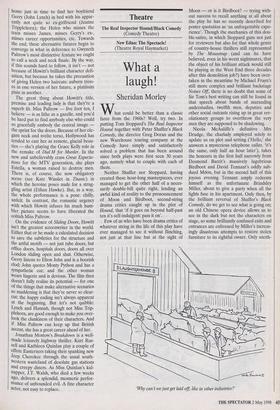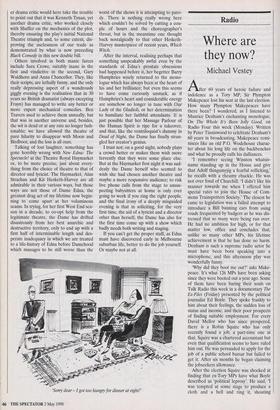Theatre
The Real Inspector Hound/Black Comedy (Comedy Theatre) New Edna: The Spectacle! (Theatre Royal Haymarket)
What a laugh!
Sheridan Morley
What could be better than a classic farce from the 1960s? Well, try two. In putting Tom Stoppard's The Real Inspector Hound together with Peter Shaffer's Black Comedy, the director Greg Doran and the new Warehouse touring company at the Comedy have simply and satisfactorily solved a problem that has been around since both plays were first seen 30 years ago, namely what to couple with each of them.
Neither Shaffer nor Stoppard, having created these hour-long masterpieces, ever managed to get the other half of a neces- sarily double-bill quite right, lending an awful kind of reality to the pronouncement of Moon and Birdboot, second-string drama critics caught up in the plot of Hound, that 'if it goes on beyond half-past ten it's self-indulgent: pass it on'.
Few of us who have been drama critics of whatever string in the life of this play have ever managed to see it without flinching, not just at that line but at the sight of Moon — or is it Birdboot? — trying with- out success to recall anything at all about the play he has so recently described for poster quotation as 'an unforgettable expe- rience'. Though the mechanics of this dou- ble-satire, in which Stoppard guns not just for reviewers but also for that whole genre of country-house thrillers still represented by The Mousetrap (and can he have believed, even in his worst nightmares, that the object of his brilliant attack would still be playing in the West End three decades after this demolition job?) have been over- taken in the meantime by Michael Frayn's still more complex and brilliant backstage Noises Off, there is no doubt that some of Sir Tom's best writing can still be found in that speech about bands of marauding understudies, twelfth men, deputies and other social outcasts rising up in great rev- olutionary groups to overthrow the very men they are supposed to be shadowing.
Nicola McAuliffe's definitive Mrs Drudge, the charlady employed solely to update us on plot and setting (11ello,' she answers a mysterious telephone caller, 'it's the same, only half an hour later'), takes the honours in the first half narrowly from Desmond Barrit's massively lugubrious Birdboot and David Tennant's oddly sub- dued Maon, but in the second half of this joyous evening Tennant amply redeems himself as the unfortunate Brindsley Miller, about to give a party when all the lights fuse in his apartment. Only then, by the brilliant reversal of Shaffer's Black Comedy, do we get to see what is going on; an old Chinese opera device allows us to see in the dark but not the characters on stage, so some brilliantly confused exits and entrances are enlivened by Miller's increas- ingly disastrous attempts to restore stolen furniture to its rightful owner. Only anoth- `Why can't we just get laid off, like in other industries?' er drama critic would here take the trouble to point out that it was Kenneth Tynan, yet another drama critic, who worked closely with Shaffer on the mechanics of the plot, thereby ensuring the play's initial National Theatre triumph and, to some extent, dis- proving the uselessness of our trade as demonstrated by what is now preceding Black Comedy in this new double bill.
Others involved in both manic farces include Sara Crowe, suitably inane in the first and vindictive in the second, Gary Waldhom and Anna Chancellor. They, like their scripts, are lethally funny, and the only really depressing aspect of a wondrously giggly evening is the realisation that in 30 years no British dramatist (always excepting Frayn) has managed to write any better or more expert mechanical comedies. Ben Travers used to achieve them annually, but that was in another universe and, besides, the wit is dead or at any rate no longer fash- ionable; we have allowed the theatre of pure hilarity to disappear with Moon and Birdboot, and the loss is all ours.
Talking of lost laughter, something has gone horribly wrong with New Edna: The Spectacle! at the Theatre Royal Haymarket or, to be more precise, just about every- thing from the choice of theatre to that of director and lyricist. The Haymarket, Alan Strachan and Kit Hesketh-Harvey are all admirable in their various ways, but those ways are not those of Dame Edna, the greatest drag act of my lifetime now begin- ning to come apart at her voluminous seams. In trying, for her first West End sea- son in a decade, to co-opt help from the legitimate theatre, the Dame has drifted disastrously from her best anarchic and destructive territory, only to end up with a first half of interminable length and des- perate inadequacy in which we are treated to a life-history of Edna before Damehood which manages to be still worse than the worst of the shows it is attempting to paro- dy. There is nothing really wrong here which couldn't be solved by cutting a cou- ple of hours and the choreographer's throat, but in the meantime one thought back nostalgically to that other Hesketh- Harvey masterpiece of recent years, Which Witch.
After the interval, realising perhaps that something unspeakably awful even by the standards of Edna's prostate obsessions had happened before it, her begetter Barry Humphries wisely returned to the mono- logue which has always been at the heart of his and her brilliance; but even this seems to have come curiously unstuck, as if Humphries's heart and considerable energy are somehow no longer in tune with Our Lady of the Gladioli, or her determination to humiliate her faithful attendants. It is just possible that her Massage Parlour of the Human Spirit is ripe for a takeover, and that, like the ventriloquist's dummy in Dead of Night, the Dame has finally stran- gled her creator's genius.
I trust not; on a good night, nobody plays a crowd better or makes them wish more fervently that they were some place else. But at the Haymarket first night it was sud- denly the Dame herself who seemed to wish she had chosen another theatre and maybe a more responsive audience; to risk live phone calls from the stage to unsus- pecting babysitters at home is only ever going to work if you ring the right people, and the final irony of a deeply misguided evening is that in soliciting, for the very first time, the aid of a lyricist and a director other than herself, the Dame has also for the first time come up with a show which badly needs both writing and staging.
If you can't get the proper staff, as Edna must have discovered early in Melbourne suburban life, better to do the job yourself. Or maybe not at all.
`Sony dear — I got too hungry for dinner at eight!'



























































 Previous page
Previous page